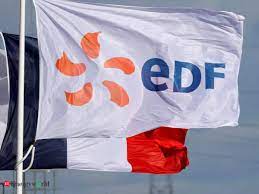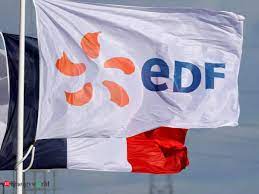
Despite the fact that energy prices rose to previously unheard-of heights, 2022 was a miserable year for France's state-controlled power company EDF, which posted annual losses of a record €17.9 billion.
Energy price caps for French consumers had a significant negative impact on EDF's profits, as did the forced shutdown of many of its nuclear power plants for maintenance.
The losses are the worst in more than 20 years and rank third in the history of French corporations.
Debts owed by EDF have risen to €64.5 billion.
On an underlying basis, EDF suffered losses of €4.99 billion. The figure stood in stark contrast to EDF's UK-based business, which generated an under-the-radar profit of £1.12 billion (€1.26 billion) while providing gas and electricity to five million households.
In response to Russia's invasion of Ukraine, President Emmanuel Macron's administration in France implemented a tariff "shield" for consumers that restricts energy companies to a 4% increase in 2022 and a 15% increase in 2023, keeping inflation lower than in other European nations.
However, it meant that EDF had to sell electricity at a loss to French consumers while UK consumers paid significantly more for their energy. In France, EDF controls about 80% of the electricity market.
Since 2002, when Vivendi Universal and France Telecom both reported losses above €20 billion for the prior year, the French industry has not experienced such dismal results.
EDF has never made such huge losses previously.
"The 2022 results were significantly affected by the decline in our electricity output, and also by exceptional regulatory measures introduced in France in difficult market conditions," said Chief Executive Luc Remont, who said EDF's priority was now to put the company back on track. He said core earnings would be significantly higher in 2023.
Due to the Covid-19 pandemic, more than half of EDF's 56 aging nuclear power stations had to be taken offline for maintenance, resulting in a 30% decrease in the company's nuclear output in France, which was already at its lowest level since 1988. Europe's largest fleet of nuclear power plants is located in France.
Due to the outages, France experienced its first net increase in electricity imports in decades.
The fact that EDF must sell a quarter of its output to rivals at a fixed price is one of many factors contributing to its financial difficulties.
The EU, which was concerned about EDF - with its enormous nuclear capacity - becoming a monopoly provider, came up with the Arenh (Regulated Access to Historic Nuclear Electricity) system in 2010.
It allowed the French electricity market to become more competitive, but according to EDF, it also put the company in the absurd position of having to subsidize its rivals.
As one former CEO put it in 2022, "surreal" things started to happen. Due to the rising price of electricity on the European market, technical issues with EDF's own generating capacity, and the government's extension of the low price guarantee to customers, EDF was forced to purchase electricity at a cost of €100 per unit and sell it to competitors at a cost of €46.
EDF contends that many of these rivals are merely market traders rather than actual players.
Three former CEOs have called the system "a poison pill" and accused Germany and the EU of manipulating it to France's detriment.
The French government already owns 84% of EDF, but steps have been taken to fully nationalize the business. Not least to Arenh, significant changes are most likely.
In order to help France achieve carbon neutrality by 2050 in accordance with EU goals, President Macron has spoken of a renaissance in the nuclear industry and plans for six new reactors.
(Source:www.dw.com)
Energy price caps for French consumers had a significant negative impact on EDF's profits, as did the forced shutdown of many of its nuclear power plants for maintenance.
The losses are the worst in more than 20 years and rank third in the history of French corporations.
Debts owed by EDF have risen to €64.5 billion.
On an underlying basis, EDF suffered losses of €4.99 billion. The figure stood in stark contrast to EDF's UK-based business, which generated an under-the-radar profit of £1.12 billion (€1.26 billion) while providing gas and electricity to five million households.
In response to Russia's invasion of Ukraine, President Emmanuel Macron's administration in France implemented a tariff "shield" for consumers that restricts energy companies to a 4% increase in 2022 and a 15% increase in 2023, keeping inflation lower than in other European nations.
However, it meant that EDF had to sell electricity at a loss to French consumers while UK consumers paid significantly more for their energy. In France, EDF controls about 80% of the electricity market.
Since 2002, when Vivendi Universal and France Telecom both reported losses above €20 billion for the prior year, the French industry has not experienced such dismal results.
EDF has never made such huge losses previously.
"The 2022 results were significantly affected by the decline in our electricity output, and also by exceptional regulatory measures introduced in France in difficult market conditions," said Chief Executive Luc Remont, who said EDF's priority was now to put the company back on track. He said core earnings would be significantly higher in 2023.
Due to the Covid-19 pandemic, more than half of EDF's 56 aging nuclear power stations had to be taken offline for maintenance, resulting in a 30% decrease in the company's nuclear output in France, which was already at its lowest level since 1988. Europe's largest fleet of nuclear power plants is located in France.
Due to the outages, France experienced its first net increase in electricity imports in decades.
The fact that EDF must sell a quarter of its output to rivals at a fixed price is one of many factors contributing to its financial difficulties.
The EU, which was concerned about EDF - with its enormous nuclear capacity - becoming a monopoly provider, came up with the Arenh (Regulated Access to Historic Nuclear Electricity) system in 2010.
It allowed the French electricity market to become more competitive, but according to EDF, it also put the company in the absurd position of having to subsidize its rivals.
As one former CEO put it in 2022, "surreal" things started to happen. Due to the rising price of electricity on the European market, technical issues with EDF's own generating capacity, and the government's extension of the low price guarantee to customers, EDF was forced to purchase electricity at a cost of €100 per unit and sell it to competitors at a cost of €46.
EDF contends that many of these rivals are merely market traders rather than actual players.
Three former CEOs have called the system "a poison pill" and accused Germany and the EU of manipulating it to France's detriment.
The French government already owns 84% of EDF, but steps have been taken to fully nationalize the business. Not least to Arenh, significant changes are most likely.
In order to help France achieve carbon neutrality by 2050 in accordance with EU goals, President Macron has spoken of a renaissance in the nuclear industry and plans for six new reactors.
(Source:www.dw.com)














